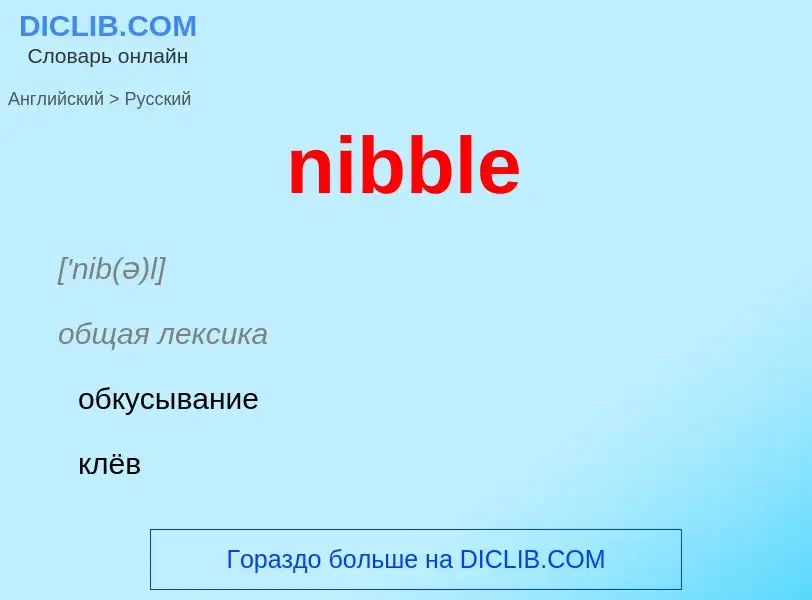Traducción y análisis de palabras por inteligencia artificial ChatGPT
En esta página puede obtener un análisis detallado de una palabra o frase, producido utilizando la mejor tecnología de inteligencia artificial hasta la fecha:
- cómo se usa la palabra
- frecuencia de uso
- se utiliza con más frecuencia en el habla oral o escrita
- opciones de traducción
- ejemplos de uso (varias frases con traducción)
- etimología
nibble - traducción al ruso
['nib(ə)l]
общая лексика
обкусывание
клёв
полубайт, нибл
4 бита (любая половина байта)
щипать
вырубный
синоним
Смотрите также
существительное
['nib(ə)l]
общая лексика
обгрызание
откусывание
чуточка
капелька
клёв (рыбы)
осторожная попытка
прощупывание почвы
клев
глагол
общая лексика
обгрызать
грызть
глодать (кость)
щипать (траву)
(at) покусывать
есть лениво
без аппетита
постепенно разрушать
подтачивать
(at) пробовать
клевать (о рыбе)
(at) клевать (кого-л.)
изводить (придирками)
придираться
(часто at) не решаться
колебаться
откусывать, покусывать
щипать (траву)
клевать (о рыбах)
есть маленькими кусочками
не решаться, колебаться
сленг
стянуть
стибрить
военное дело
наносить ряд слабых ударов по обороне противника
Definición
Wikipedia

In computing, a nibble (occasionally nybble, nyble, or nybl to match the spelling of byte) is a four-bit aggregation, or half an octet. It is also known as half-byte or tetrade. In a networking or telecommunication context, the nibble is often called a semi-octet, quadbit, or quartet. A nibble has sixteen (24) possible values. A nibble can be represented by a single hexadecimal digit (0–F) and called a hex digit.
A full byte (octet) is represented by two hexadecimal digits (00–FF); therefore, it is common to display a byte of information as two nibbles. Sometimes the set of all 256-byte values is represented as a 16×16 table, which gives easily readable hexadecimal codes for each value.
Four-bit computer architectures use groups of four bits as their fundamental unit. Such architectures were used in early microprocessors, pocket calculators and pocket computers. They continue to be used in some microcontrollers. In this context, 4-bit groups were sometimes also called characters rather than nibbles.

![octet]] [[code page 866]] font table ordered by nibbles. octet]] [[code page 866]] font table ordered by nibbles.](https://commons.wikimedia.org/wiki/Special:FilePath/Octets in CP866 ordered by nibbles.png?width=200)
